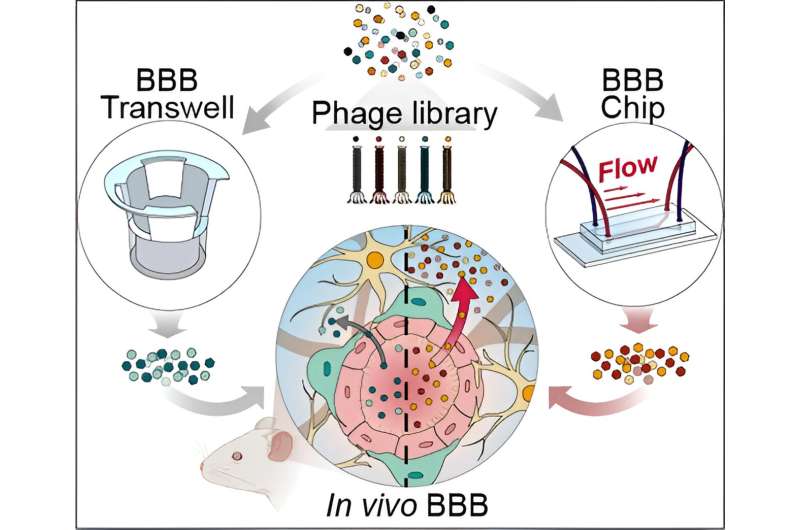
Optimizing drug supply programs (DDS) for the organic atmosphere of organs and blood vessels is essential for maximizing the effectiveness of drug therapy. A analysis workforce, affiliated with UNIST has provide you with a novel technique to maximise the therapeutic efficacy of medicine by way of the utilization of organ-on-a-chip (OoC) expertise.
The findings, now revealed in ACS Nano, recommend that OoC expertise holds appreciable promise for advancing analysis in vascular-targeted DDS because of its correct simulation of molecular transport inside endothelial programs.
The analysis workforce, collectively led by Professors Tae-Eun Park and Taejoon Kwon within the Division of Biomedical Engineering at UNIST has created an OoC that mimics the blood-brain barrier (BBB) through mouse cell tradition, leading to considerably enhanced permeability of therapeutic medicine. Utilizing the cell-based phage show screening technique, they precisely simulated the physiological traits of organs, setting a brand new normal for in vitro modeling.
Their findings demonstrated enhanced cerebrovascular permeability in comparison with typical transwell strategies. The analysis workforce anticipates that OoC expertise will make a major contribution to the event of focused remedies tailor-made to particular organs, together with the liver, kidney, and lung, amongst others.
The correct replication of the organic atmosphere inside the chip, together with the construction and performance of glycocalyx on blood vessel surfaces, enabled the invention of an efficient drug-delivery peptide by way of simulated blood stream. This superior simulation of shear stress and glycocalyx construction enabled the invention of an efficient drug-delivery peptide, demonstrating its potential for focused remedies in numerous organs, together with liver, kidney, and lung.
The analysis workforce famous that OoC expertise holds appreciable promise for advancing analysis in vascular-targeted DDS because of its correct simulation of molecular transport inside endothelial programs.
Co-author Jeong-Received Choi acknowledged, “Lengthy-term chip expertise can be utilized as a robust device for locating drug carriers with focused features by intently mimicking organic environments.”
Co-author Kyungha Kim added, “We’ve got confirmed that long-term chip expertise can precisely mannequin human organic tissues, opening new potentialities for future drug supply system analysis.”
Extra data:
Jeong-Received Choi et al, Organ-on-a-Chip Strategy for Accelerating Blood–Mind Barrier Nanoshuttle Discovery, ACS Nano (2024). DOI: 10.1021/acsnano.4c00994
Quotation:
Organ-on-a-chip mimics blood-brain barrier for higher drug supply (2024, July 1)
retrieved 2 July 2024
from https://phys.org/information/2024-07-chip-mimics-blood-brain-barrier.html
This doc is topic to copyright. Other than any honest dealing for the aim of personal examine or analysis, no
half could also be reproduced with out the written permission. The content material is offered for data functions solely.


